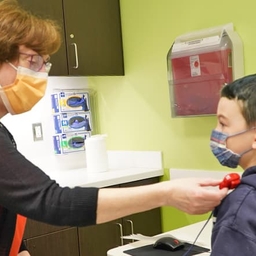
What to Do If Your Child Stutters
Jan 5, 2021
As America is poised to inaugurate a president who stutters, a CHOP speech-language pathologist offers facts about stuttering and advice for caregivers.
Experts from CHOP’s Allergy Program are recognized as global leaders in the management of allergic conditions and have helped formulate many of the national guidelines used by physicians around the world.

Jan 5, 2021
As America is poised to inaugurate a president who stutters, a CHOP speech-language pathologist offers facts about stuttering and advice for caregivers.

Dec 30, 2020
Amanda Berry, PhD, MSN, BSN, CPNP, received the Rodney Appell Continence Care Champion Award at the annual Society of Urologic Nurses and Associates meeting.
Dec 30, 2020
The Medical Assistance Transportation Program offers door-to-door medical transport to your child’s appointments at CHOP as well as a mileage reimbursement program if you use your own vehicle to drive to your child’s medical appointments.
Dec 30, 2020
Children born with spina bifida may have unique patterns of academic strengths as well as challenges. Read advice on how parents can advocate for their child.
Dec 29, 2020
For 25 years, CHOP’s Center for Fetal Diagnosis and Treatment has worked tirelessly to advance the field of fetal medicine and offer lifesaving care for pregnancies diagnosed with birth defects. Here, we reflect on the past and think ahead to what the future holds.
Dec 20, 2020
CHOP researchers have identified knowledge gaps in the metrics currently used to measure quality in pediatric/congenital cardiac catheterization laboratories.
Dec 17, 2020
Andrew B. Grossman, MD, from our Center for Pediatric Inflammatory Bowel Disease discusses the reassuring studies in this MedPageToday article.
Dec 17, 2020
New Cell Models Help Researchers Study Disease Development and Growth Issues in Beckwith-Wiedemann Syndrome
Dec 17, 2020
Find out about genetics and ingredients related to the mRNA vaccines and concerns about spreading the virus after vaccination.
Dec 15, 2020
Adolescent drivers were more likely to get behind the wheel post-concussion than return to exercise or organized sports, suggesting the need for evidence-based guidelines